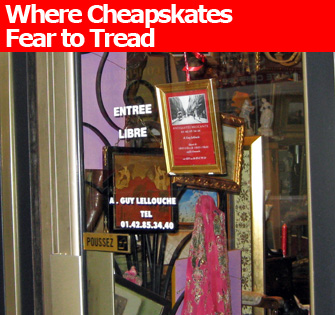 |
|
Some principles of the Paris retail system seem to defy logic. |
It’s not so common any more, but you can still find shops in Paris with a sign on the door reading “entrée libre”— literally “free” or “unrestricted entry.” When I first moved here this struck me as very odd. Why have a sign on a store announcing that people can come in? Isn’t that pretty much what having a store is all about? Isn’t it kind of like having a sign on a preschool saying “children allowed”?
I imagined an entrepreneur giving a pitch to potential investors: “I’ve got this incredible revolutionary idea for a retail venture. You’ll probably think I’m crazy but just hear me out. What I’m going to do is rent a ground-floor storefront space, fix it up nicely, stock it with products, and then — hold on to your seats now, because this is the really beautiful part — I’m actually going to let people come in, off the street, and purchase the goods! Yes! Try to picture it! But we’ve got to move fast before someone else beats us to it!”
Later it occurred to me that maybe the reason for the entrée libre sign was to distinguish these shops from the exclusive jewelers and antique dealers that only receive customers by appointment. But even that turned out to be wrong. The point is this: traditionally, entry to a French retail outlet is by default not free and unrestricted — the understanding is that once you set foot inside you are going to buy something. You can’t be “just looking.”
I say “traditionally” because most stores no longer observe this custom. Over the past 20 years or so, entrée libre has become the default — except for food shops, which are still the holdout. That’s why most butchers, bakers, greengrocers and fish mongers are open to the street or have a huge display window: you’re supposed to be able to see their wares before entering and refrain from taking up their space, time, attention and oxygen unless you have firm plans to blow some euros.
Shoppers violate this rule at their peril. I once went to a wine shop hoping to find a specific brand of an obscure aperitif that my wife likes. There were four or five customers ahead of me and only one clerk. All of the bottles on sale were readily visible and, seeing that they didn’t have what I wanted and that it might be 15 minutes before I could even explain this (another unposted rule: no talking to the sales staff out of turn), I wheeled around and headed for the door. The clerk was vividly unhappy about this and called after me, “Oh, Monsieur!” with a look of outraged exasperation on his face, as though I had just loudly released a fog of paint-blistering flatulence and was now fleeing the scene.
In the civic interest, I would suggest that to avoid confusion, the remaining non-entrée libre stores put up a notice saying the exact opposite: “sortie payante” – entry may be free, but getting out is going to cost you.
Reader Ronald Hurwitz writes: “Once again you have left me in stitches. I’ve never been able to comprehend those signs. Your explanation was illuminating. Sort of makes me feel like all the people who say, ‘Oh, I had that idea to write War and Peace before Tolstoy did, but I was too busy fixing the tractor’; or the guy who says, ‘What’s so great about Jackson Pollack’s drip paintings? I could have done that before he did but my wife insisted I fix the toilet first, and then I had to call a plumber after I couldn’t complete the job, and…’ I’ve thought about those signs but you actually wrote the piece. Oh well, I COULD have done it, but the dog ate all my stationery.’ Thanks for another great laugh.”
Reader Silvia Bianconcini writes: “Here in Italy it’s exactly the same. I’ve always thought that this was pretty absurd for the very same reasons you described in your article. But, as a matter of fact, new shops (and young shopkeepers) are slightly changing this strange behavior, and more and more of them don’t want you to purchase in any case. So, should you ever come to Italy, you might find this behavior – but not everywhere.”
© 2011 Paris Update
An album of David Jaggard’s comic compositions is now available for streaming on Spotify and Apple Music, for purchase (whole or track by track) on iTunes and Amazon, and on every other music downloading service in the known universe, under the title “Totally Unrelated.”
Note to readers: David Jaggard’s e-book Quorum of One: Satire 1998-2011 is available from Amazon as well as iTunes, iBookstore, Nook, Reader Store, Kobo, Copia and many other distributors.
